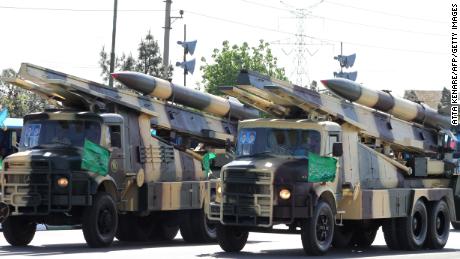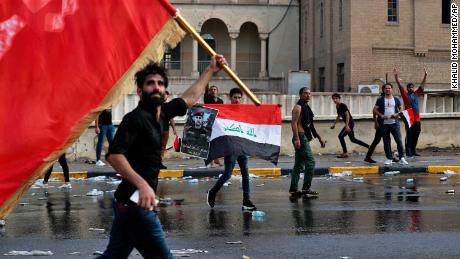Iraq Prime Minister calls protesters’ demands ‘righteous,’ as 38 killed in demonstrations

Thousands have been involved in Iraq's nationwide protests, which are among the largest seen in decades and which were sparked by frustration over alleged government corruption, lack of basic services and growing unemployment. In a conciliatory speech broadcast on state television early on Friday, Prime Minister Adil Abdul-Mahdi called the demonstrators' demands for work opportunities and comprehensive reforms "righteous," adding that the government needs to exert "greater effort" to combat corruption.Abdul-Mahdi said the government would "soon" present a project to offer a basic wage for the poor so that "all Iraqi families can live in dignity." "Everyone should respect the rule of law by which everyone can live in security and stability," he added. At least 38 people have died and another 1,610 people injured in ongoing protests, Ali Akram al-Bayati, a member of the Independent High Commission for Human Rights of Iraq, told CNN. Of those killed, 35 are protesters and three are security officers. According to al-Bayati, 359 Iraqi security personnel and 1,251 are demonstrators are among the injured. Al-Bayati from the Independent High Commission for Human Rights of Iraq called on international organizations to urgently help hundreds of wounded people as hospitals are running out of blood supplies.
How the protests unfolded
Long power outages, rising unemployment and rampant government corruption have led to growing discontent in recent years. Many in the country have limited access to basic services such as electricity and clean water, and the unemployment level is around 10%. Demonstrations erupted in the capital Baghdad and in several provinces across Iraq on Tuesday and Wednesday. Abdul-Mahdi promised on Tuesday to try to provide jobs to university graduates and said all contracts with foreign companies would stipulate that 50% of the jobs should go to Iraqis. On Wednesday, hundreds of angry protesters stormed the governors' offices in Najaf and Nasiriyah, setting fire to parts of the buildings, according to state-run Iraqiya television.That same day, Prime Minister Adil Abdul-Mahdi held an emergency meeting with members of the national security council to discuss the "unfortunate events," according to a statement released by his office. Although a curfew was imposed in Baghdad and several other cities, sporadic protests continued on Thursday.Authorities imposed an internet blackout and shut down 75% of the internet across the country, according to Netblocks, an NGO monitoring internet disruption. By late Thursday, up to 60% of internet connectivity had been restored, according to Netblocks. There was a heavy security presence on the capital's streets, with closures on the city's main arteries, several Baghdad residents told CNN.
Abdul-Mahdi promised on Tuesday to try to provide jobs to university graduates and said all contracts with foreign companies would stipulate that 50% of the jobs should go to Iraqis. On Wednesday, hundreds of angry protesters stormed the governors' offices in Najaf and Nasiriyah, setting fire to parts of the buildings, according to state-run Iraqiya television.That same day, Prime Minister Adil Abdul-Mahdi held an emergency meeting with members of the national security council to discuss the "unfortunate events," according to a statement released by his office. Although a curfew was imposed in Baghdad and several other cities, sporadic protests continued on Thursday.Authorities imposed an internet blackout and shut down 75% of the internet across the country, according to Netblocks, an NGO monitoring internet disruption. By late Thursday, up to 60% of internet connectivity had been restored, according to Netblocks. There was a heavy security presence on the capital's streets, with closures on the city's main arteries, several Baghdad residents told CNN.  In Baghdad, protesters tried to cross a bridge leading to the fortified Green Zone — home to government buildings and embassies — two security officials inside the area told CNN. Demonstrators also blocked the road to the airport. Security forces fired tear gas, water cannon and live ammunition to disperse the crowds, according to a joint statement released by Iraq's Interior and Health Ministries. Iraq's defense minister has ordered the country's armed forces to be on high alert, and deployed extra security troops to Baghdad International Airport.
In Baghdad, protesters tried to cross a bridge leading to the fortified Green Zone — home to government buildings and embassies — two security officials inside the area told CNN. Demonstrators also blocked the road to the airport. Security forces fired tear gas, water cannon and live ammunition to disperse the crowds, according to a joint statement released by Iraq's Interior and Health Ministries. Iraq's defense minister has ordered the country's armed forces to be on high alert, and deployed extra security troops to Baghdad International Airport.
International response
The United States-led coalRead More – Source




